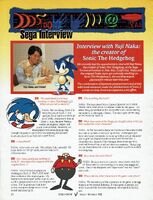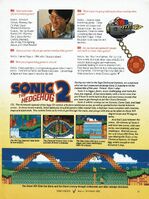Information in this article is about real-life people, companies, and objects, which do not relate to the in-universe Sonic series. |

|
When rewriting sections, remember to adhere to our Manual of Style.
|
Yuji Naka (中 裕司 Naka Yūji?) is a former video game designer, programmer and producer. He was the lead programmer of the original Sonic the Hedgehog game for the Sega Genesis/Mega Drive and a former, executive head of Sonic Team. He left Sega in 2006. Yuji Naka is the co-creator of Sega's mascot, Sonic the Hedgehog, alongside Naoto Ohshima and Hirokazu Yasuhara.
History[]
Early life[]
Yuji Naka developed an interest in computers earlier on by his favorite musician that used coding to make music. He began his career working at Nihon Microcomputer Academy part-time during high school and was tasked with porting games between gaming platforms.[8] Originally, he wanted to work at Namco, the video game company that created Pac-Man but ironically became defunct after its merge in 2006, the same year Naka left Sega. But Yuji Naka couldn't, because he did not get very good grades in high school and couldn't go to university. Back then, Sega and Taito were the only companies that would hire people without a university degree; Naka chose the former.[9]
After joining Sega in 1984, Yuji Naka would stay at their boarding house, Sega Omori dormitory. He would spend his first month training his skills, which followed immediately to making his first game.
As Yuji Naka was in the middle of his training, his section manager tasked him with a project, "think about making a game for girls", as part of his training. Naka collaborated this assignment together with Hiroshi Kawaguchi, who was also in the middle of his own training. Two months later, the manager called Naka and simply said, "Well, I'm going to sell it." After a five month development period, Girls' Garden was released in 1985 on the SG-1000 (the precursor of the Sega Master System), with positive reviews noting to be "one of the more technically impressive games" on Sega's hardware for its time.[3]
Sonic the Hedgehog[]
In 1991, Yuji Naka would later find himself in charge of programming the original Sonic the Hedgehog game, while Naoto Ohshima designed the characters and Hirokazu Yasuhara designed the levels, debuting the Sonic the Hedgehog franchise. Naka has also produced many other titles like Nights into Dreams..., Burning Rangers, Phantasy Star Online, Sega Superstars, Billy Hatcher and the Giant Egg and Rodea the Sky Soldier. In early games he was often credited as "YU2" (in reference to Yu Suzuki) and "Muuu Yuji". He is one of the few famous Japanese game creators to speak fluent English.
When asked about the infamous Nintendo vs. Sega console wars of the 1990's, specifically in North America that had resulted in the Genesis directly competing with the Super Nintendo Entertainment System to a near-stalemate, in an episode of Icons, he states that his intentions while making the original Sonic the Hedgehog game were different than the direction it was taken, and that the fierce comparisons between their respective iconic mascots Sonic and Mario were actually a misunderstanding by the media. He also says that he is good friends with Nintendo's Shiegru Miyamoto and that Sega had respect for their rival with their Super Mario games, which were viewed as a watermark of quality for Sega to strive.[10]
Yuji Naka would later reflect on his time in the video game industry, from his beginning through the fable "console wars" to leaving the Sonic the Hedgehog series in the June 2009 issue of Nintendo Power. He was asked how he saw the video game industry change over time. Naka, interestingly, compared the games, such as Sonic's classic games, made during the console war as novels, games that allowed the players freedom to use their imaginations, while the direction taken by the video game industry turned games into movies with marketing's pursuit for realism, laying out everything, and diminishing the player's creative response to the games. What he missed the most was being involved with hardware development, reflecting that it was fun battling Nintendo in that area.[11]
Leaving during mid-development of Sonic the Hedgehog (2006)[]
In May 2006, while Sonic the Hedgehog (2006) and Sonic and the Secret Rings were in production behind closed doors, it was announced that Naka was leaving Sega to create his own game studio, Prope.[4] This decision bears resemblance to Naoto Ohshima's departure of Sonic Team in 1999, when he founded Artoon.
In 2009, Yuji Naka would later speak with Nintendo Power about leaving Sega. He was satisfied with the decision, stating his independence in Prope felt like the freedom old Sonic Team had during the Classic era.[12]
Square Enix[]
In 2018, Naka joined Square Enix and founded its action game brand, Balan Company, with Ohshima. Naka directed Balan Wonderworld, with Ohshima as character designer, and with Ohshima's Arzest developing. It was the first time the two have worked together since Sonic Adventure. In June 2021, it was revealed on his Facebook page that he was no longer working at Square Enix.[13] Naka later confirmed this on his Twitter account, where he also stated that he was considering retirement altogether.[14] In September 2021, Naka stated that he was teaching himself programming in order to work on a mobile phone game.[15]
Criminal Charges[]
On 17 November, 2022, Naka was taken in by Japanese law enforcement. Along with ex-employees, Fumiaki Suzuki and Taisuke Sazaki, Yuji Naka is arrested on suspicion of insider trading related to non-public information about Dragon Quest Tact. Naka allegedly bought 10,000 shares of developer Aiming before the unspecified information was made public.[16]
Reported on 7 December 2022, Yuji Naka was re-arrested alongside Sazaki for more insider trading for the mobile game Final Fantasy 7: The First Soldier, purchasing a total of 120,000 shares into developer ATeam.[6] Naka was formally indicted on 27 December 2022 for the insider trading charges.[7]
On 2 March 2023, it was reported by Japanese TV Networks TBS and NHK that Yuji Naka has admitted in court to insider trading over the ownership of ATeam's shares worth around £865,000.[17] 3 months later on 1 June 2023, prosecutors moved forward and demanded Yuji Naka serve two and a half years in prison.[18] On 7 July, a Tokyo District Court judge gave Naka a sentence of two years and six months in prison, suspended for four years. The judge ordered Naka to forfeit 171 million yen (US$1.2 million) and pay a fine of two million yen (US$20,000).[19]
On 7 April 2024, Naka made a statement on X (formerly Twitter) for the first time in 16 months since November 2022, accusing the producer of Dragon Quest Yu Miyake for lying in court documents.[20]
Notable non-Sonic works[]
- Girl's Garden (1985) - Programmer
- Phantasy Star (1987) — Programmer
- Ghouls 'n Ghosts (1988) - Programmer (Mega Drive version)
- NiGHTS into Dreams... (1996) — Producer and Programmer
- Samba de Amigo (1999) - Producer
- Balan Wonderworld (2021) — Director
Credits[]
Games[]
Lead Programmer[]
- Sonic the Hedgehog (1991) - Program (as YU2)
- Sonic the Hedgehog 2 (1992) - Chief Programmer (as YU2)
Producer & Lead Programmer[]
- Sonic the Hedgehog 3 (2 February 1994) (NA)
- Sonic & Knuckles (18 October 1994) (JP)
Producer[]
- Sonic Jam (1997)
- Sonic R (1997) - General Producer
- Sonic Adventure (1998)
- Sonic Adventure 2 (2001)
- Sonic Advance (2001)
- Sonic Adventure 2: Battle (2001)
- Sonic Advance 2 (2002)
- Sonic Adventure DX: Director's Cut (2003)
- Sonic Pinball Party (2003)
- Sonic Battle (2003)
- Sonic Heroes (2003)
- Sonic Advance 3 (2004)
- Shadow the Hedgehog (2005)
- Sonic Rush (2005)
Executive Producer[]
- Sonic Riders (2006)
- Sonic the Hedgehog (2006)
- Mario & Sonic at the Olympic Games (2007)
Supervisor & Producer[]
- Sonic the Hedgehog Pocket Adventure (1999) (as Y.Naka)
Advisor[]
- Sonic 3D: Flickies' Island (1996) - Advisors (SOJ)
Compilations[]
- Sonic Mega Collection (2002) - Producer
Special Thanks[]
- 3D Sonic the Hedgehog (2013)
- 3D Sonic the Hedgehog 2 (2015)
A Special Bow To[]
- Sonic Spinball (1993)
Crossovers[]
- Sega Superstars (2004) - Producer
Animation[]
- Sonic the Hedgehog: The Movie (1996) - Co-production director
- Sonic X (2003-2006) - Executive producer
Trivia[]
- Yuji Naka's first game, Girls' Garden, for the Sega SG-1000, was released 8 months prior to Nintendo's Super Mario Bros. for the Nintendo Entertainment System, in 1985.
- According to an interview with Nintendo Power, when Yuji Naka played the original Super Mario Bros. (which admitted he greatly enjoyed), he would dash through the first level as fast as he could to reach the level-skip cheat in the next level. This inspired him to create a game, such as Sonic the Hedgehog, where the goal was to finish the level as soon as possible.[21] This is the primary reason of Sonic's trademark super speed.
- During development of the original Sonic the Hedgehog, Naka reportedly suffered from motion sickness during play-testing. Because of this, the game's pace was ultimately slowed down in the final version.[citation needed]However, later Genesis-era games would return to the original speed.
- The Level Select cheat code in Sonic the Hedgehog 2 is accessed by putting Yuji Naka's birthday into the Sound Test (19, 65, 9, 17).
- In the 2009 issue of Nintendo Power, Yuji Naka would respond to the questionnaire's curiosity on Sonic's longevity, stating he himself doesn't know what makes Sonic the Hedgehog so special to the point he became one of the most successful and recognized video game characters of all-time.[22]
- In 2004, Naka would help develop Sega Superstars as a Producer, giving Sonic the Hedgehog his first appearance in a game rated higher than "E for Everyone" by the ESRB, before future, talented creatives worked on the mainline titles.
- The powerful Super Transformation ability seen since Sonic the Hedgehog 2, according to Yuji Naka, was inspired by the Dragon Ball franchise, specifically the Super Saiyan transformation, which he himself is a fan of.
- According to Yuji Naka, he himself was the one to approach Nintendo about the idea of Mario & Sonic at the Olympic Games.[23]
- Naka was given a Ferrari car as a golden handshake to persuade him to rejoin the Sonic Team when he left in the early 1990s.[24]
- Yuji Naka was originally supposed to appear in the Sonic the Hedgehog film as an extra, but self-admittedly was forgotten by both parties during production.[25]
- In Shadow the Hedgehog, as an Easter Egg, the GUN Soldiers will sometimes say, "Mr. Yuji Naka is alright."
Gallery[]
References[]
|
External links[]
- Yuji Naka on Twitter
- Yuji Naka on Facebook
- Prope official website
- Yuji Naka at the Internet Movie Database
- Yuji Naka at Wikipedia, the free encyclopedia
| Producers | Akinori Nishiyama · Takashi Iizuka · Yuji Naka · Yoji Ishii |
|---|---|
| Programmers | Takahiro Hamano · Takeshi Sakakibara · Tetsu Katano · Yuji Naka · Yoshihisa Hashimoto |
| Designers | Eitaro Toyoda · Hirokazu Yasuhara · Kazuyuki Hoshino · Makoto Yonezu · Manabu Kusunoki · Naoto Ohshima · Nobuhiko Honda · Hiroshi Miyamoto · Sachiko Kawamura · Shinichi Higashi · Shiro Maekawa · Shun Nakamura · Takashi Yuda · Yasushi Yamaguchi · Yoshitaka Miura · Yuji Uekawa |
| Directors | Hiroshi Nishiyama · Kenjiro Morimoto · Morio Kishimoto · Takashi Iizuka |
| Sound engineers | Hideaki Kobayashi · Jun Senoue · Kenichi Tokoi · Mariko Nanba · Masaru Setsumaru · Naofumi Hataya · Takahito Eguchi · Tatsuyuki Maeda · Teruhiko Nakagawa · Tomoya Ohtani |
| Other | Tomoko Kanemoto · Yui Karasuno |


